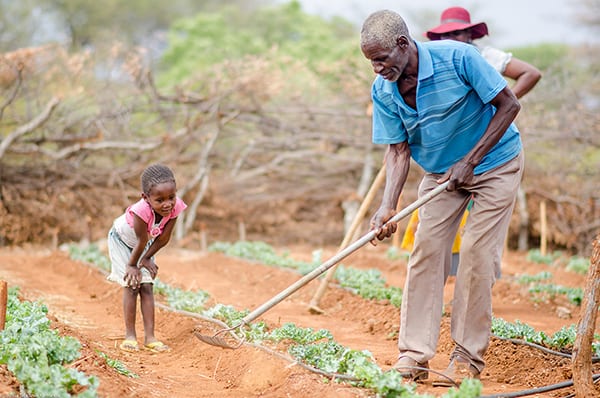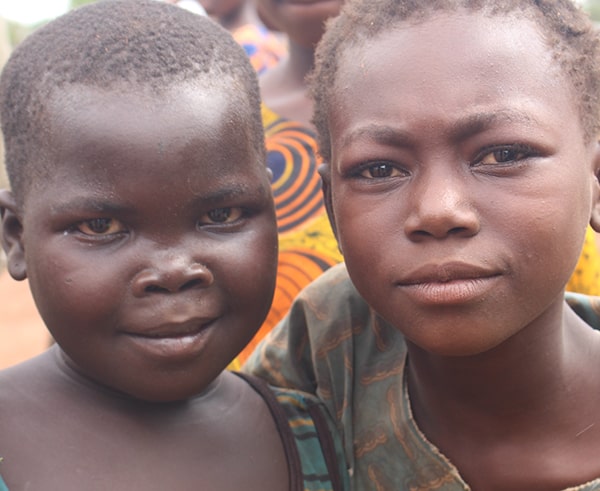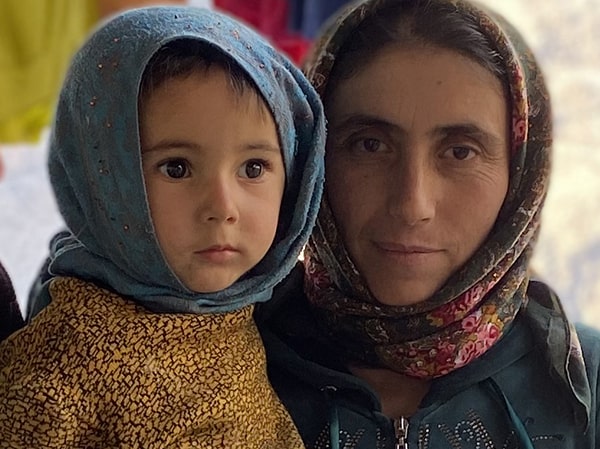Help Stop Hunger and Malnutrition That Claims Lives and Cripples Communities
By Emily Pyatt

In the toughest places on earth, food shortages are a growing problem. Many children, families, and refugees around the globe lack access to nutritionally balanced meals. In the last year global shutdowns, wars, and disasters have dramatically increased food shortages for millions of vulnerable people.
Right now over two billion people worldwide do not have enough to eat. And because of COVID-19 and other factors, as many as 270 million people could soon face food insecurity. Experts predict the number of people in extreme poverty — living on less than $2 a day — will rise for the first time in over 20 years.
To help meet immediate needs and provide sustainable solutions to hunger, Unto® team members distribute meals and provide agriculture training for suffering individuals and families. As people’s physical needs are met, they experience the kindness of Jesus and learn about His hope.
A Garden for Arafa

Have you ever seen a young child put a toy in her mouth? Sometimes even adults chew on things, like the end of a pen cap. It is a habit a lot of people have.
That is what an Unto team member thought when she saw Arafa* chewing on a stick in her remote village in central Africa. Our team member watched her tear and twist a small stick of new growth from a tree, and once she got it off, she gnawed on it like adults do with pen caps. Soon it became apparent that Arafa was not chewing on the stick out of habit, but because she was hungry. So little food was available in her village that she was looking for nutritional value in things like sticks that she pulled from trees.
Arafa lives in a small, round clay hut with her parents and siblings. Unto team members visited her village to teach local church planters how to grow vegetables in a garden. Forty church planters were expected to attend the workshop but when the team arrived, 87 men had traveled from all over the country to learn how to grow sustainable food in their harsh desert climate.
Team members introduced the men to modern gardening techniques like composting, raised beds, and adding layers of organic materials to the soil. They helped install bucket drip irrigation systems in the garden to make up for the lack of rain that occurs in the region. They even worked with a local agronomist, an expert in crop production, to make sure they had access to seeds that would produce plants tolerant to heat and limited water.
At the end of the training, the church planters were well equipped to return to their homes and recreate the garden they had been trained to build. What they learned will help them grow food year-round, instead of just during the three-month rainy season. The methods will allow them to produce enough food to feed hundreds of people at their local churches.
For Arafa a sustainable garden in her village means that she no longer must chew on sticks to get the nutrients she needs. She now has access to a healthy, continuous food source. Her physical needs have been met by a tangible act of kindness — planting a garden. And because of the local church planters in her area, she is also hearing about the eternal Hope of Jesus.
Meals and Hope for Mary’s Family

In the small villages that dot remote mountainous regions of one Central Asian country, many families struggle with poverty and lack sufficient food. Unto’s in-country staff members distributed meals to residents in many of these villages. Traveling to three or four villages per day, they delivered meals to show physical care for approximately 1,000 people.
Mary’s family members work as shepherds, generating income by herding the livestock of other families. They leave their village for several months from spring to fall to take sheep, cows, and horses into the meadowlands of the mountains for feeding. During this time they struggle to access the nutrition they need.
During visits by local Unto staff members, Mary’s family received meals, and they heard about the eternal hope of Jesus. Mary had already accepted this hope through her relationship with the local staff team. She also had the joy of seeing her 21-year-old son do the same, and one day he will be able to tell his baby girl about Jesus too. This family received both spiritual and physical food that will impact generations to come.
In places like this one, humanitarian assistance is the main reason government authorities allow ministry to continue. The gift of meals allows Unto staff teams to meet tangible needs, build relationships, and share about the eternal hope of Jesus at the right time.
Another woman who also received the gift of meals told our team,
“You are envoys of God . . . I was concerned about the needs of our people, and God sent us food and other aid. See how happy they are. The children themselves have sung blessings for Unto and their partners. I am deeply grateful. Thank you for the love you show towards us. We will remain open to hearing about your faith.”
For Mary and her family, meals express the kindness of Jesus in a very real way. They mean life and hope for now and for the future.
You Can Make a Difference
The global food crisis is impacting millions, but you can help change that!
For just 13 cents you can provide a healthy meal for a hungry child who otherwise does not know where the next meal will come from.
Get your whole family involved and really make an impact! Continue reading to learn how to use Our Humanitarian Quest to teach the children in your life about hunger and how they can make a difference.
*Names changed for security purposes.
Teach children how to share help and hope!
Our Humanitarian Quest is a FREE interactive series designed to help you talk with children about the suffering so many people around the world experience and how they can make a significant impact.
Discover real-life stories from people in the toughest places, study the Bible together, and take a walk in someone’s shoes as you explore activities and crafts that illustrate what life is like for people in need. Throughout the activity you will find discussion questions to help children process what they are learning and plan out practical ways they can care for people around the world.
Published August 19, 2021

Emily served with Cru® as a Communication Specialist at Unto®. She holds a B.S. in Rhetoric and Public Communication from Northern Illinois University.





